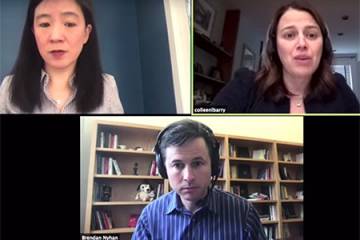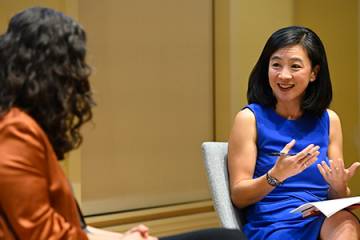Against the backdrop of nationwide protests against police brutality and racism, the SNF Agora Institute at Johns Hopkins brought together three Baltimore clergy members Friday for a wide-ranging discussion of faith leadership in times of crisis.
"I've struggled. I had to go to my dungeon and be shaken by the Lord out of the overwhelming sense of anger, frustration, and despair that was gripping me," said Bishop Douglas Miles, pastor of Koinonia Baptist Church in northeast Baltimore. "Because even looking at [police violence] in relation to the pandemic, we find all of us in America in the same storm. But we're not all in the same boat."
The conversation took the place of the weekly pandemic-themed speaker series the SNF Agora Institute has hosted since March. In her introduction to the talk, SNF Agora Institute inaugural director Hahrie Han, a professor of political science, said the pivot in direction for the speaker series was necessary in order to understand the "extraordinary political movement unfolding" across the country and to answer questions about democracy, citizenship, and governance that are central to the institute's mission to expand civic engagement. This Friday, the institute will hold a conversation exploring the history of the political movement to transform policing and what a new system of public safety might look like. It will feature JHU political scientist Vesla Weaver and Harvard University's Daniel Ziblatt.
The conversation Friday was led by Rev. Frances Murphy Draper, founding pastor of the Freedom Temple African Methodist Episcopal Zion Church in the Lakeland neighborhood of Baltimore. She opened the discussion with a video of a spoken word poem written in response to the death of George Floyd, who died May 25 of cardiopulmonary arrest after a Minneapolis police officer knelt on his neck while detaining him.
Draper also began the discussion with a passage from scripture: "And the Lord God formed man of the dust of the ground, and breathed into his nostrils the breath of life; and man became a living being," she read from Genesis. "One thing we take for granted is the breath God has given us," she said. "And we reflect on the fact that … George Floyd said 'I can't breathe.'"
The talk also included Rev. David J. Ware, rector of the Church of the Redeemer in Baltimore's North Homeland neighborhood. Together, the group explored how places of worship can offer guidance to congregations during times of crisis, and how more must be done to address the scourge of racism in policing.
"Racism itself is sin, and [we must] bring back a moral clarity to that instead of viewing it as just a sociological issue," Miles said.
The problem is not just one for the African American community alone to confront, added Ware.
"I lead a mostly white congregation, I'm white—we've benefited from this sin," he said. "This moment presents itself as an opportunity, and I'm really trying to seize it, to invite more and more folks to wake up, and for those who've been awake to go more deeply into the systems that we have perpetuated and benefited from."
The problem is one that requires unity and cooperation, Miles said. The faith leaders discussed how they have been working with their congregations to build ties to communities and to organizations that support Baltimoreans, such as BUILD, which Miles co-chairs. They also called for further communion with their own church members, even if the coronavirus pandemic means these meetings take place virtually.
In closing, Draper called the protests an awakening for the church that calls for action as well as prayerful reflection and repentance.
"It's a wake-up call for us to watch and pray, to protest and pray—to be like Nehemiah and have the tool of building in one hand and, if we have to, the tool to fight in the other hand," Draper said.
Posted in Politics+Society
Tagged snf agora institute, racial justice, racism, democracy










